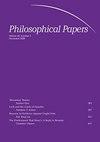Does Global Democracy Require a World State?
IF 1.3
3区 哲学
0 PHILOSOPHY
引用次数: 1
Abstract
Abstract The question of whether global democracy requires a world state has with few exceptions been answered with an unequivocal ‘No’. A world state, it is typically argued, is neither feasible nor desirable. Instead, different forms of global governance arrangements have been suggested, involving non-hierarchical and multilayered models with dispersed authority. The overall aim of this paper is to addresses the question of whether global democracy requires a world state, adopting a so-called ‘function-sensitive’ approach. It is shown that such an approach is equipped to resist the predominant binary view of a world state (either accepting it or rejecting it) and offer a more differentiated and nuanced answer to this question. In brief, a basic presumption of a function-sensitive approach is that the content, justification and status of principles of democracy are dependent on the aim they are set out to achieve, what functions they are intended to regulate (e.g., decision-making, implementation, enforcement and evaluation), and the relationship between those functions. More specifically, within a function-sensitive framework, the paper sketches the contours of an account of global democracy consisting of five regulative principles and argues—utilizing the notion of ‘sufficient stateness’—that it would require supranational legislative entities and perhaps supranational judicial entities but not necessarily supranational executive entities.全球民主需要一个世界国家吗?
摘要全球民主是否需要一个世界国家的问题,除了少数例外,得到了明确的“否”回答。人们通常认为,一个世界性的国家既不可行,也不可取。相反,有人提出了不同形式的全球治理安排,涉及权力分散的非层级和多层模式。本文的总体目的是解决全球民主是否需要一个世界国家的问题,采用所谓的“功能敏感”方法。研究表明,这种方法能够抵制世界国家的主流二元观点(要么接受,要么拒绝),并为这个问题提供一个更具差异性和细微差别的答案。简言之,对职能敏感方法的一个基本假设是,民主原则的内容、理由和地位取决于它们旨在实现的目标、它们旨在规范的职能(例如决策、执行、执行和评估)以及这些职能之间的关系。更具体地说,在一个功能敏感的框架内,该论文描绘了由五项监管原则组成的全球民主的描述轮廓,并利用“充分国家性”的概念认为,这将需要超国家立法实体,也许需要超国家司法实体,但不一定需要超国家执行实体。
本文章由计算机程序翻译,如有差异,请以英文原文为准。
求助全文
约1分钟内获得全文
求助全文
来源期刊

Philosophical Papers
PHILOSOPHY-
CiteScore
2.10
自引率
0.00%
发文量
18
期刊介绍:
Philosophical Papers is an international, generalist journal of philosophy edited in South Africa Original Articles: Articles appearing in regular issues are original, high-quality, and stand-alone, and are written for the general professional philosopher. Submissions are welcome in any area of philosophy and undergo a process of peer review based on initial editor screening and refereeing by (usually) two referees. Special Issues: Topic-based special issues are comprised of both invited and submitted papers selected by guest editors. Recent special issues have included ''Philosophy''s Therapeutic Potential'' (2014, editor Dylan Futter); ''Aging and the Elderly'' (2012, editors Tom Martin and Samantha Vice); ''The Problem of the Criterion'' (2011, editor Mark Nelson); ''Retributive Emotions'' (2010, editor Lucy Allais); ‘Rape and its Meaning/s’ (2009, editor Louise du Toit). Calls for papers for upcoming special issues can be found here. Ideas for future special issues are welcome.
 求助内容:
求助内容: 应助结果提醒方式:
应助结果提醒方式:


